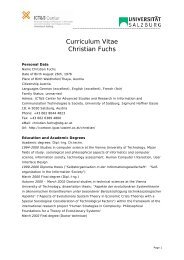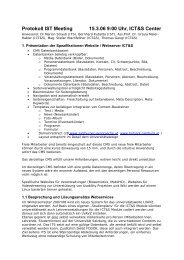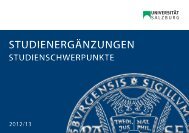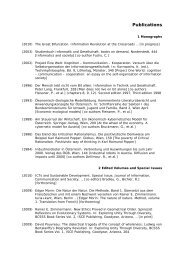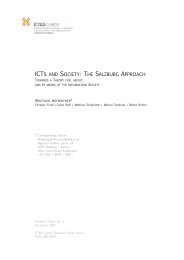CHRISTIAN FUCHS - ICT&S - Universität Salzburg
CHRISTIAN FUCHS - ICT&S - Universität Salzburg
CHRISTIAN FUCHS - ICT&S - Universität Salzburg
Create successful ePaper yourself
Turn your PDF publications into a flip-book with our unique Google optimized e-Paper software.
Christian Fuchs: Social Networking Sites and the Surveillance Societygets “fucked up” although you have agreat CV and a great job interview.und Vorstellungsgespräch dieJobchance „versaut”#409 1 To be “spied on” by a third party von Dritten „ausspioniert“ werden#454 1 The surveillance society Überwachungsstaat#459 1 That others spy on me dass Leute mir nachspionieren#531 1, 2 Privacy, transparent identity Privatsphäre, gläserne Identität#604 5 I think the greatest danger is to losecontact to the “real” world and todiscontinue or strongly minimize thereal contact to friends.#650 6 Stalking Stalking#657 1, 5, 10 The transparent individual! Uses nolonger have time for friends,contemplation, family and otherreally important things, etc, but arerather busy all day to add, toactualize and to answer comments,etc.Ich denke die größte Gefahr bestehtdarin, den Kontakt zur “wirklichen”Welt zu verlieren und den realenKontakt zu Freunden abzubrechenoder stark zu minimieren.Der gläserne Mensch! Die Nutzerhaben keine Zeit mehr für Freunde,zum Nachdenken, für Familie undwirklich wichtige Dinge etc, sondernsind den ganzen Tag damitbeschäftigt, zu adden, zuaktualisieren und auf Kommentareusw zu antwortenTable 20. Examples for disadvantages that were listed by the respondentsThe data of our survey show that 59.1% consider maintaining existing contacts and29.8% establishing new contacts as major advantage of social networking sites,whereas 55.7% say that surveillance as a result of data abuse, data forwarding, or alack of data protection is a major threat of such platforms. Communication and theresulting reproduction and emergence of social relations are overwhelminglyconsidered as major advantage, potential surveillance overwhelmingly as majordisadvantage. The impression of the majority of the respondents is that socialnetworking sites enable communicative advantages that are coupled with the risk ofsurveillance and reduced privacy. How can we explain that they are willing to take thesurveillance risk that they are knowledgeable and conscious about? Communicationand surveillance are antagonistic counterparts of the usage of commercial socialnetworking platforms: Our data show that students are heavily using social networkingsites and are willing to take the risk of increased surveillance although they are verywell aware of surveillance and privacy risks. The potential advantages seem to outstripthe potential disadvantages. It is not an option for them not to use social networkingplatforms because they consider the communicative and social opportunities associatedwith these technologies as very important. At the same time they are not stupid,uncritical, or unaware of potential dangers, but rather very conscious of thedisadvantages and risks. They seem to fear that they miss social contacts or will havedisadvantages if they do not use platforms such as studiVZ, Facebook, MySpace. Notusing these technologies or stopping using them is clearly not an option for most ofthem because it would result in disadvantages such as reduced social contacts and thefeeling of not participating in something that has become important for the younggeneration. The crucial aspect of the antagonism between communicative opportunitiesand the surveillance risk is that alternative social networking platforms that are non-96



